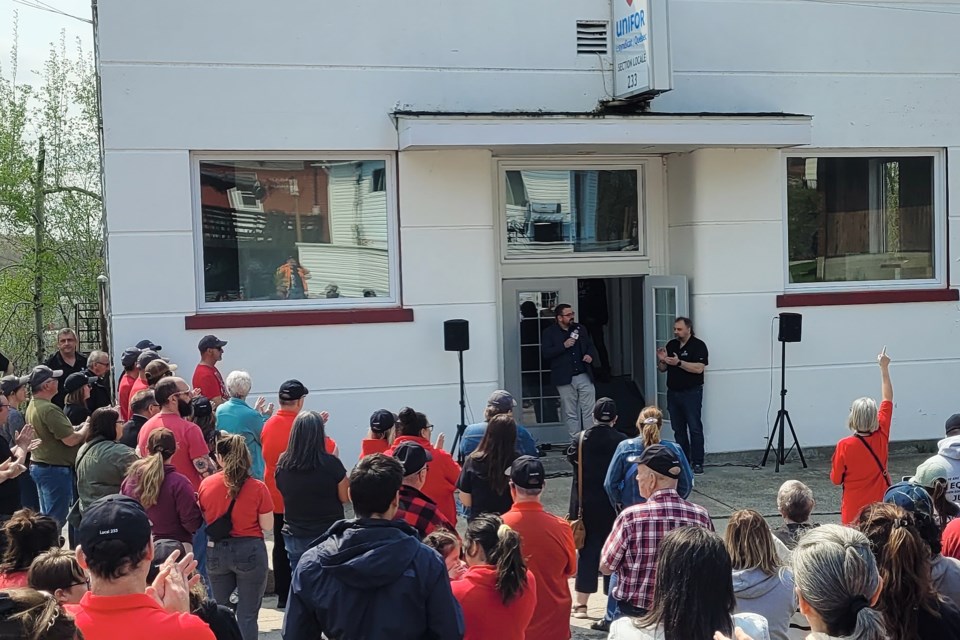There’s little joy in Témiscaming, especially for workers at Rayonier Advanced Materials (RYAM), many of whom will be losing their jobs. BayToday reached out to Stéphane Lefebvre, President of Unifor Local 233, who was working at his union office at the RYAM plant.
“A sombre mood,” was how he summed up the atmosphere on the job. “We shut down the drive machine for the speciality cellulose yesterday,” he said, and now, they’re working to “mothball” the area, “shut the lights off, and put it to bed.”
“This is a crisis, this is my community in crisis,” he emphasized. “The governments are sitting on their hands.”
SEE: It’s official, RYAM lays off 275 workers at Témiscaming plant
At this point, not much can be done to remedy the crisis or save those jobs. There has been talk of buying the plant, but Lefebvre said RYAM has little to no interest in selling, as any new buyer would be a competitor.
“We haven’t heard anything, the company is still not sharing anything with me, it’s been very quiet,” he said. He mentioned a “local group is interested in finding a solution, either purchasing or investing in the company, but we still don’t know what our future holds.”
It’s like 1973 all over again, Lefebvre noted, a pivotal time in Témiscaming’s history, when after much work from Frank Dottori, local entrepreneurs, unionized workers, and the government, this group was able to purchase the mill from the previous owner who was planning to shut it down. That’s when Tembec was born.
In May of 2017, Tembec was sold to Rayonier Advanced Materials, a publicly traded company headquartered in Jacksonville, Florida.
If only history could repeat itself, “That would be the best scenario,” Lefebvre said, “that we could find ownership for the plant here for the whole site and be able to prosper again because there’s definitely potential here.”
On Tuesday, July 15, Unifor announced that the 275 layoffs were now official, but workers and the union had known since late April. Of the 275 who received those letters, 203 are Unifor members, Lefebvre said. The others mainly worked in the office and administration, he added, “and many of them are already gone.”
A layoff of this size in a small town of around 2,400 affects everyone, Lefebvre said. “It’s people’s lives, the community, these are our friends, our families, and there’s no good way of handling a situation like this.”
There is still some work left for the laid-off union members, Lefebvre said, as mentioned, the Témiscaming High Purity Cellulose plant must be shut down, and there’s some training that needs to be done for those workers who are taking new positions at the mill.
“I don’t have a date or a timeline from the company for when the people will actually be walking out,” Lefebvre said.
He detailed how on April 29, when RYAM announced the pending layoffs, “they gave letters” to the 203 unionized employees, because with “a layoff of this size,” the province demands employers give employees at least 12 weeks' notice – which could mean a final date of August 12, Lefebvre noted.
“Nobody is leaving unless it's on their own before August 12th,” he said. However, he reiterated there has been no timeline set, “and not everybody’s going to walk out on that date.”
It’s not an easy time for anyone, he emphasized. You have long-serving union workers training those who still have a job how to do their old jobs. Lefebvre said he often feels torn as well, trying to protect the members who are let go while ensuring those 300 remaining still get what they deserve.
“If they have seniority, they bump into a different part of the plant,” he said. “That’s the plan, which is where the training comes in. It’s going to be a very emotional and difficult road ahead of us.”
Some who were laid off have been offered retirement packages, Lefebvre said, but he couldn’t give details on that, to maintain confidentiality with the employer. For those of retirement age, “there was an incentive for them to retire,” he said.
He noted that some workers have clocked in 35 to 45 years at the plant, and one has 49 years of seniority. “They’re not ready to retire yet” but some will, Lefebvre added, “it gives somebody younger a chance to keep their job.”
Lefebvre reiterated that the ideal solution would be to buy the plant – “everything is for sale for a price.” After all, he continued, “RYAM does not want to be here, and we definitely don’t want RYAM here. If they had any intentions of being here, they wouldn’t be selling off a part of the site and shuttering the other part.”
“Sell the mill and get out of town.”
David Briggs is a Local Journalism Initiative reporter who works out of BayToday, a publication of Village Media. The Local Journalism Initiative is funded by the Government of Canada.



